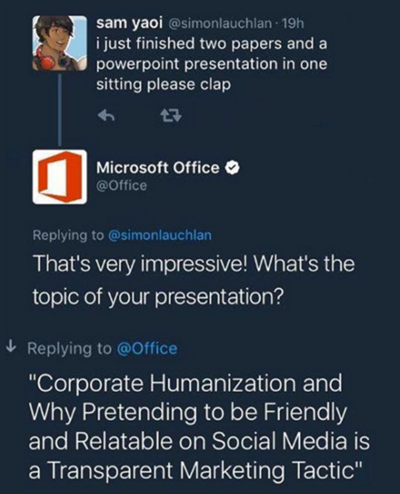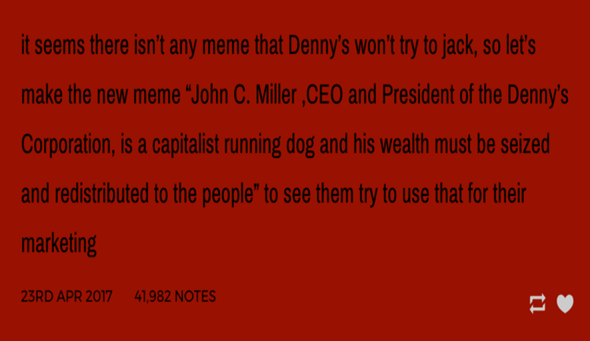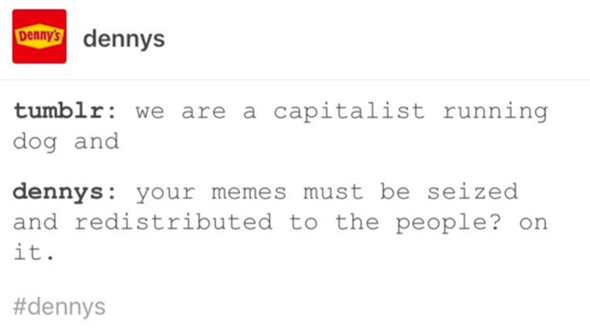


Content Marketing Ad Absurdum
Resistance is futile. Satire feeds the machine. Have another pancake.

Things are getting Weird over at Denny’s Tumblr. Known for its outstanding social media strategy, Denny’s is the master of corporate memejacking. It has the uncanny ability to parrot the absurdist non-sequiturs and erratic cadence of internet youthspeak with freakish accuracy.
Many brands have tried to adopt this wolf in sheep’s clothing approach to getting down with the kids, but few have so insidiously succeeded. It’s a tactic that often serves to alienate and annoy rather than to endear, and when brands try and approach digital natives on their own turf they run the risk of being trolled:

Denny’s succeeds where other companies have failed because they’ve acquired genuine fluency in the idiom. The tone and form of Denny’s content is largely indistinguishable from organic posts on Tumblr. Reactions have been mostly positive: @DennysDiner has 384K followers on Twitter, and their blog posts regularly get tens of thousands of notes. For many denizens of the social media site, there’s a gleeful novelty to interacting with a giant brand as if they were just another quirky adolescent troll. We know that behind the whimsical, meme-literate façade is a big corporation trying to sell us junk food – but the cognitive dissonance compels us to keep watching the spectacle.
However, there’s a large contingent who are less impressed by Denny’s unholy powers of impersonation – those who hold the conviction that some things should remain free of the taint of mass-marketing. As this article articulately puts it:
“There is literally nothing so stupid or shameful that the person who runs @DennysDiner will not tweet it. This butcher's assistant to the bloody dismemberment of all meaning is beyond even the small breath of pity you might summon for "person who runs @DennysDiner"; its existence is the worst thing on the internet, even worse than a meal at Denny's.”
One similarly irked Tumblr user, sick of Denny’s’ erosion of the integrity of memes, issued this challenge:

This led to a very post-modern thing happening on my dashboard.

A communist meme attacks the cynically appropriative marketing tactics of a massive fast-food diner chain’s online persona; the diner’s online persona re-appropriates the communist meme to retort that Tumblr is in fact a capitalist entity and thus the memes disseminated on the platform are fair game.This is a complex utterance with multiple ironies at play, but in essence it’s a slap in the face, pointing out that even subversive internet humour owes its existence to monetized media platforms and is thus complicit with the values and institutions it satirizes. All your memes are belong to the running capitalist dog, which was you all along. Resistance is futile. Satire feeds the machine. Have another pancake.
The post has sparked a polarized debate, and I’m torn in my response. On the one hand, I appreciate it because it’s very clever, both as marketing and as a cultural artefact in its own right. And, as one side of the argument goes, what’s the big deal about brands being cute on social media? It’s not as if an actual deception has occurred here; as if people had been suddenly divested of the illusion that Denny’s Tumblr was the personal blog of a guy called Denny. So the funny content transparently also exists to drive a profit – so what? At the end of the day, the evil corporate mastermind of this post is just some social media marketer having fun on the job. Denny’s is just people making a living.
The other side of the debate views Denny’s Tumblr as a symptom of the Age of Trump, in which institutions of power seem to have transcended satire. Individuals such as Trump and Milo Yiannopoulos are powerful largely because you cannot argue with them. As self-parodies, they forestall and disable parody. They shut down rational discussion with inanity, non-sequitur, absurdity – troll tactics. This essay traces the rise of Trump and the alt-right back to the disaffected nihilism of 4chan, arguing that the President basically trolled his way into the White House. There is a feeling that meaning and language, our discursive tools for engaging with power, are being corroded by the lolz, and we need to fight to protect them where we can.
In this light, Denny’s memejacking looks less like funny marketing and more like part of a sinister cultural shift. And I understand those who respond, “I don’t want your nasty pig grease, Denny’s – get off my lawn and out of my language!” Yet a troll thought forbids me from committing to this perspective, lest I risk taking things too seriously.
Posted 5 May 2017